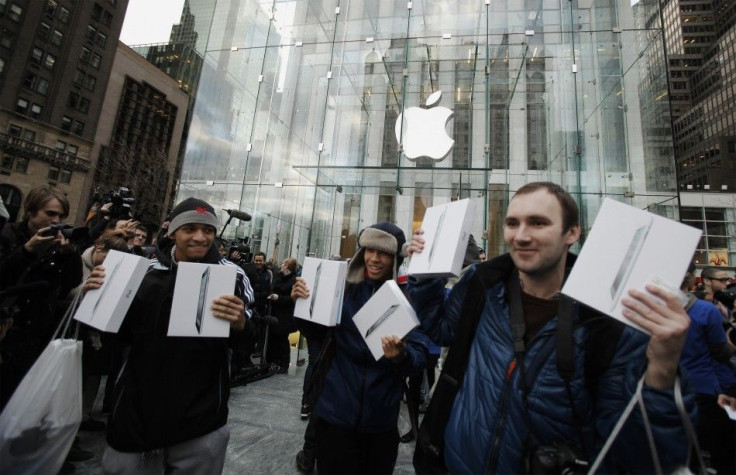iPhone Patent Wars: Could it all End in a Truce?

Smartphone and tablet developers like Apple, Samsung Electronics, Google and HTC are in court daily suing each other over patents and intellectual property violations.
When they don't sue in courts, they complain to bodies such as the U.S. International Trade Commission or the European Community, which can levy fines, assess damages and bar foreign products from being sold.
At stake are burgeoning markets and new opportunities to hook consumers for the long run. Smartphone sales are expected to leap 62 percent this year to 478 million units, estimates IHS iSuppli, compared with a meager 13 percent growth for all mobile phones.
Growth for tablets, like Apple's iPad, HP's TouchPad, Samsung Electronics' Galaxy, is much faster --- about 300 percent to 69.5 million, Gartner estimates.
The usual practice in technology is that unit prices will decrease but manufacturers will make money on the volume.
Big money is at stake. In July, the so-called "Rockstar Bidco" group shelled out $4.5 billion for 6,000 wireless patents from defunct Nortel Networks of Canada. The members were Apple, Microsoft, Research in Motion, EMC, Sony and Ericsson, who outbid Google, Intel and RPX in a round that started at only $900 million.
In reaction, InterDigital, a King of Prussia, Pa., holder of 1,300 wireless patents, hired investment bankers to auction its IP on July 18. The company's market capitalization has soared 73 percent since, to around $3.4 billion.
That's one reason why 36 percent of all U.S. patent lawsuits filed in the U.S. this year by the Fortune 100 have been in the tech sector, along with an additional 11 percent for telecommunications, according to Ocean Tomo, the Chicago-based intellectual property investment bank.
"When you have hot products, the competitors all stand around in a circle and fire at each other," said Dan Scovel, of Tokeneke Research. "The only solution is an armistice."
That's what happened in the PC wars of the late 1980s and the 1990s, as the x86 microprocessor that fueled the explosion of PCs was fought over by co-developer Intel and Advanced Micro Devices. The two California semiconductor giants fought for years in every conceivable court and spent tens of millions on litigation.
Finally, they settled, on Nov. 12, 1999, Intel and AMD cross-licensed each other and dropped the case. The deal has held ever since, although Intel expressed concern when AMD, of Sunnyvale, Calif., sold its manufacturing lines and other assets to GlobalFoundries, a holding company controlled by Abu Dhabi interests.
But there may no truce this time, lawyers and bankers say, because the sector is so dynamic. As well, governments outside the U.S. are vigorously defending their intellectual property, especially in emerging markets.
"When a business is growing quickly, the market share gets very sensitive," said Michael Molano, a partner with Mayer Brown in its Silicon Valley practice. "If a company detects it's losing market share, the first thing management says is, 'I'm going to call my lawyer and tell him I want to see what patents have been infringed and I want you to start a war.' "
Tech companies with deep pockets, like an Apple, Google, Motorola Mobility or Samsung, can easily afford the $3 million average cost of a lawsuit, said S. Gregory Boyd, a patent lawyer with Davis & Gilbert in New York.
Boyd believes the chip precedent will ultimately prevail among the smartphone and tablet developers, with the possible exception of small "patent trolls" or entities whose sole purpose is to sue for patent rights.
"Peace is always better than war," Boyd said. Besides cross-licensing, settlements could include royalty payments or straight cash settlements, which allow the technology players to get back to work.
Ocean Tomo CEO James Malackowski is not so sure. Noting a surge in IP cases over the past 25 years, he said the "détente" or "mutual assured destruction" strategy of the chip wars may not hold in the new era.
"The big gladiators are still fighting each other," Malackowski said. "But there are new kids on the block. Asian manufacturers have nothing to lose by suing about IP."
Some of the biggest players, including Apple, no longer manufacture their own products, effectively entrusting their crown jewels to contract manufacturers, like a Foxconn in Taiwan and China, or HTC in Taiwan.That may be why it has filed suit against rival manufacturers but not yet against Google itself, whose Android OS runs on the rival products.
"Today the companies are fighting over a product that has consumer appeal," so each vendor wants to differentiate among products that often share similar technologies, the Ocean Tomo CEO said.
Malackowski, whose firm participated in the Nortel Networks auction, said "it doesn't take a rocket scientist" to see that the big vendors are also concerned their IP might migrate away from the U.S. to China but then to even less-developed venues like Africa.
While the U.S. International Trade Commission plans to evaluate claims by Apple that Samsung violated its patents, it's not likely to bar Samsung from U.S. markets. On the other hand, the European Union appears to have taken a tougher line.
This week, a German court issued a preliminary injunction barring Samsung from shipping its Galaxy tablets in most of Europe, accepting a complaint by Apple that it had "slavishly" copied its IP. Samsung on Friday announced it would appeal, at a hearing scheduled for Aug. 25.
In the U.S., Congress has been working on patent reform but generally maintains "a laissez-faire attitude," said Ocean Tomo's Malackowski. That could mean tougher sailing down the line.
© Copyright IBTimes 2024. All rights reserved.












